By Brian Nixon —
Roughly one-hundred-and-sixty miles apart stands two gravesites holding the remains of men who experienced early deaths.
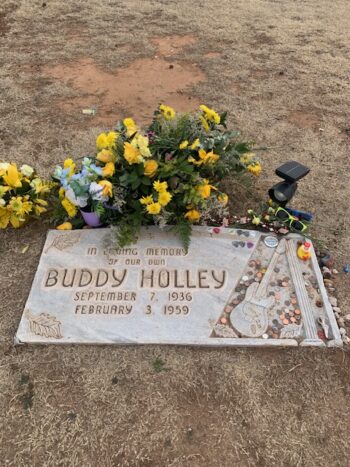
In Lubbock, Texas pop star Buddy Holly’s gravestone reads, “In Loving Memory of Our Own Buddy Holley” (the birth spelling of his name), with the dates September 7, 1936—February 3, 1959, written below.
In Fort Sumner, New Mexico, Billy the Kid’s stone is as simple. Buried along with friends and co-Regulators (the outlaw gang) Tom O’Folliard and Charlie Bowdre, Kid’s grave heading states, “Pals.” Under the Kid’s section is written, “William H. Bonney, Alias Bill the Kid. Died July 1-th” (the number 4 has worn away).
One a recent trip I stood to gaze upon both gravesites.
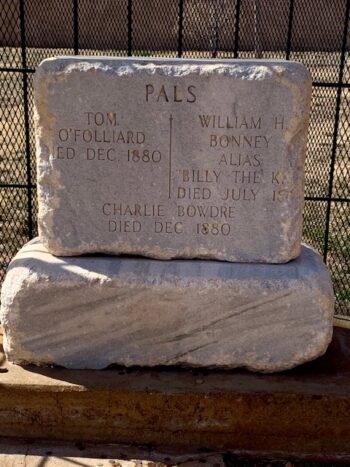
Comparisons between the two young men are interesting. Both died young: Holly at 22; Billy the Kid at 21 (some claim age 22). Both were famous in their short lifetimes: Holly for his music and songwriting; Kid for his criminal activity. Both were sons of the Southwest: Holly from West Texas; Billy the Kid grew up—in his formative years—in New Mexico. Both had relationship with Latina women. Holly married Maria Elena Santiago, and Billy the Kid’s girlfriends were Paulita Maxwell (an Anglo Hispanic woman) and Celsa Gutierrez. Both had a Christian influence growing up: Holly was a member of the Tabernacle Baptist Church; Billy the Kid grew up in an Irish-Catholic family.
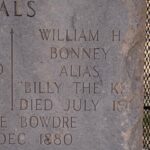
I suppose comparisons could continue, but my point is not to contrast them, but to use them to ask a question: What would be written on your gravestone? Put another way, what epitaph would summarize your life?
Here’s a few epitaphs from notable people that Merkle Monuments listed:
- “Murdered by a traitor and coward whose name is not worthy to appear here”—Outlaw Jesse James.
- “3.14159265358979323846264338327950288”—Mathematician Ludolph van Ceulon, the person to calculate the value of Pi.
- “That’s All, Folks”—the voice of Looney Tunes, Mel Blanc.
- “There Goes the Neighborhood”—Comedian, Rodney Dangerfield.
- “Free at last, free at last, Thank God Almighty I’m free at last”—Martin Luther King, Jr.
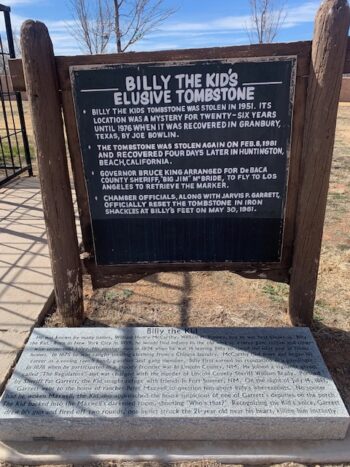
The internet is full of funny, serious, and strange epitaphs.
When our son died, my wife Melanie and I gave thoughful attention to what to put on Riley’s gravestone. In the end, we decided upon a scripture text: Psalm 139:14.
The word epitaph is taken from the Greek, eptáphios, meaning “a funeral oration.” It’s a short text honoring a person. Though a blurb about a person can’t summarize a life, an epitaph tries to encapsulate the countenance of the person.
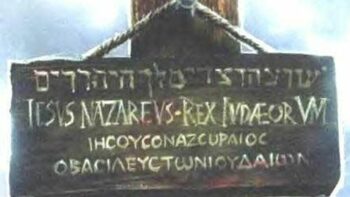
The most famous epitaph in history was placed above the head of a man from Galilee, given over to an army to be killed. The Apostle John records the epitaph as “Jesus of Nazareth, the King of the Jews” (John 19:21).
Like Holly and the Kid, Jesus died young. Like Holly, Jesus created stories that live on, and like the Kid, Jesus was deemed a criminal. But unlike both, Jesus was something marvelous, the Godman. And, unlike Holly or Billy the Kid, his grave doesn’t contain any remains; Jesus’ grave is empty.

And though Jesus’ epitaph didn’t encapsulate the totality of his life and teachings, it did get something right: He was king, connected to divine authority by Matthew (see 21:5), John (12:15), the writer of Hebrews (1:3,8) Paul (I Timothy 6:13-15), and the Book of Revelation (17:14).
Likewise, Jesus identified as a king of a heavenly kind. In John 18:36 Jesus states, “My kingdom is not of this world…” Furthermore, prophetic announcements proclaimed the Messiah as king (see Isaiah 9:6-7 and Daniel 7:13-14).
Jesus and kingship go together. Theologians define the three-fold offices of Christ as prophet, priest, and king. As prophet, Jesus was the Father’s Word, proclaiming God’s truth, the end of sin, and the offer of salvation. As priest, Jesus was the final sacrifice, the mediator between the Father and humanity. As king, Jesus reigns in supreme authority, ruling with perfect justice and love.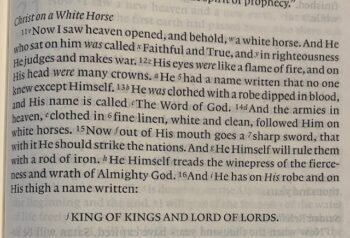
With the start of lent (a time of self-reflection and self-denial), be mindful of two things: One, we all die. How are you living that would warrant an epitaph worthy of God’s truth, beauty, or goodness? And two, remember that the greatest epitaph ever written has a message for you: Jesus is king. How are you paying homage to him this season, bowing before the “King of Kings, and Lord of lords” (Revelation 19:16)?
Take some time this season and use Holly’s famous love song “Words of Love” and sing it to Christ, changing it to “Word of love, Whisper soft and true, Lord, I love you.”



